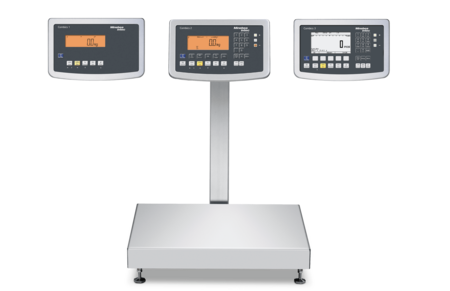Industrial Scales vs. Regular Scales: What’s the Difference in Performance?
Industrial Scales vs. Regular Scales: What’s the Difference in Performance?
Blog Article
Why to Select Industrial Scales for Accurate Weight Measurement in Various Industries
In an era where precision is paramount, the selection of industrial scales for accurate weight measurement plays an important duty throughout varied sectors. These scales not just enhance operational performance yet additionally make certain compliance with regulatory criteria, impacting everything from manufacturing to delivery. Their robust style and progressed innovation deal with different applications, strengthening the demand for meticulous weight management. Recognizing the subtleties of these ranges is important for any kind of organization aiming to optimize processes and mitigate expensive errors. The question remains: what specific aspects should one consider when choosing the right scale for their special functional demands?
Importance of Accurate Weight Measurement
In the world of industrial procedures, the relevance of accurate weight dimension can not be overemphasized. Specific weight dimension is foundational throughout numerous fields, affecting both functional effectiveness and item high quality - Industrial Scales. It works as a critical consider inventory management, making certain that materials are appropriately accounted for, thus minimizing waste and lowering prices
In production, precise weight measurement straight affects manufacturing processes. Abnormalities in weight can lead to substandard items or extreme resource allowance, influencing overall profitability. Furthermore, in industries such as pharmaceuticals and food manufacturing, adherence to stringent weight requirements is vital for regulative conformity and customer security.
Additionally, precise weight dimensions assist in efficient logistics and supply chain administration. Correctly considered shipments make sure that transport expenses are optimized which stock degrees are preserved precisely, consequently preventing supply lacks or overstock situations.
Sorts Of Industrial Scales
A wide range of industrial ranges are readily available, each created to fulfill certain measurement needs across varied industries. Typical types consist of floor ranges, which are ideal and robust for weighing large products or pallets in storehouses and distribution. Bench scales are smaller and suitable for lighter products, usually made use of in retail setups or manufacturing for exact portion control.
An additional category is mobile scales, which offer the adaptability to be moved conveniently around task sites, making them suitable for field procedures or short-term arrangements. Accuracy scales, on the other hand, are developed for high accuracy and are regularly used in research laboratories and quality assurance environments.
Load cells are important parts in different industrial scales, transforming pressure into an electric signal for precise readings. Additionally, truck ranges provide the ways to weigh heavy vehicles and their lots, guaranteeing compliance with regulations and enhancing logistics.
Lastly, checkweighers instantly compare the weight of items versus predetermined restrictions, improving quality guarantee in assembly line (Industrial Scales). Each kind of industrial scale offers an unique feature, satisfying the specific demands of markets such as manufacturing, logistics, food processing, and drugs
Advantages of Making Use Of Industrial Scales
Continually making use of industrial scales offers considerable advantages across different industries. Among the primary advantages is improved accuracy in weight measurement, which is essential for maintaining high quality criteria and governing compliance. Precise measurements avoid expensive errors in manufacturing, delivery, and inventory monitoring, eventually resulting in raised operational efficiency.
Moreover, industrial scales are created for durability and effectiveness, allowing them to withstand extreme atmospheres usually discovered in manufacturing and warehousing. This resilience makes certain a long life-span, decreasing the requirement for frequent substitutes and discover this maintenance costs.

Furthermore, employing industrial scales enhances safety and lessens waste. By ensuring that products are weighed precisely, companies can avoid overloading lorries, which can result in penalties and mishaps.
Applications Across Different Industries
Industrial scales play a critical role in various industries, including manufacturing, logistics, food processing, and pharmaceuticals. In production, these scales are important for guaranteeing that resources are determined accurately, thus keeping item quality and uniformity (Industrial Scales). Precision in weight measurement straight impacts manufacturing you can check here efficiency and expense management
In logistics, industrial scales promote the precise weighing of deliveries, which is vital for adhering to optimizing and shipping regulations freight prices. Exact weight information aids simplify operations and improves supply chain monitoring.
The food handling market depends heavily on industrial ranges for conformity with health and wellness laws. They are made use of to weigh components precisely, guaranteeing that formulations meet both read the full info here top quality criteria and legal requirements. This is essential not only for consumer security however additionally for maintaining brand name honesty.
Drug companies utilize commercial scales to guarantee precise dosages in medicine manufacturing, where also the smallest deviation can have considerable repercussions. Conformity with rigid governing requirements makes accurate weight measurement vital in this sector.
When Choosing Scales,## Factors to Consider.
Picking the right range for details applications needs cautious factor to consider of numerous factors. The capability of the scale is essential; it should suit the maximum weight of the items being measured without surpassing its restrictions. Additionally, the readability, or tiniest increment the scale can properly show, is important for precision, specifically in markets where weight discrepancies can bring about considerable monetary losses or security issues.
Ecological conditions also play a significant role in range option. Scales utilized in damp or destructive settings might require specialized products to make certain sturdiness. Transportability may be essential in specific applications, requiring light-weight and battery-operated designs.

Final Thought
Finally, the choice of industrial scales is critical for making sure precise weight dimension throughout varied markets. Their ability to give specific analyses not only enhances functional effectiveness yet additionally sustains regulatory conformity and supply administration. The flexibility and longevity of these ranges facilitate their application in various fields, ultimately adding to set you back reduction and boosted item quality. Hence, investing in premium commercial scales is necessary for companies aiming to make the most of and maintain high criteria productivity.

Report this page